
Forrest Gump is a 1994 American comedy-drama film directed by Robert Zemeckis and written by Eric Roth. It is an adaptation of the 1986 novel of the same name by Winston Groom, and stars Tom Hanks, Robin Wright, Gary Sinise, Mykelti Williamson, and Sally Field.

John Marcellus Huston was an American film director, screenwriter and actor. He wrote the screenplays for most of the 37 feature films he directed, many of which are today considered classics. He received numerous accolades including two Academy Awards and three Golden Globe Awards. He also received a star on the Hollywood Walk of Fame in 1960 and the BAFTA Fellowship in 1980.

All That Jazz is a 1979 American musical drama film directed by Bob Fosse and starring Roy Scheider. The screenplay, by Robert Alan Aurthur and Fosse, is a semi-autobiographical fantasy based on aspects of Fosse's life and career as a dancer, choreographer and director. The film was inspired by Fosse's manic effort to edit his film Lenny while simultaneously staging the 1975 Broadway musical Chicago. It borrows its title from the Kander and Ebb tune "All That Jazz" in that production.
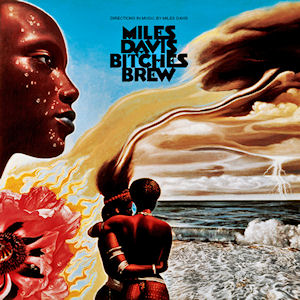
Bitches Brew is a studio album by the American jazz trumpeter, composer, and bandleader Miles Davis. It was recorded from August 19 to 21, 1969, at Columbia's Studio B in New York City and released on March 30, 1970, by Columbia Records. It marked his continuing experimentation with electric instruments that he had featured on his previous record, the critically acclaimed In a Silent Way (1969). With these instruments, such as the electric piano and guitar, Davis departed from traditional jazz rhythms in favor of loose, rock-influenced arrangements based on improvisation. The final tracks were edited and pieced together by producer Teo Macero.
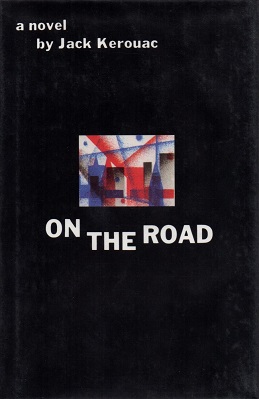
On the Road is a 1957 novel by American writer Jack Kerouac, based on the travels of Kerouac and his friends across the United States. It is considered a defining work of the postwar Beat and Counterculture generations, with its protagonists living life against a backdrop of jazz, poetry, and drug use. The novel is a roman à clef, with many key figures of the Beat movement, such as William S. Burroughs, Allen Ginsberg, and Neal Cassady represented by characters in the book, including Kerouac, himself, as the narrator, Sal Paradise.
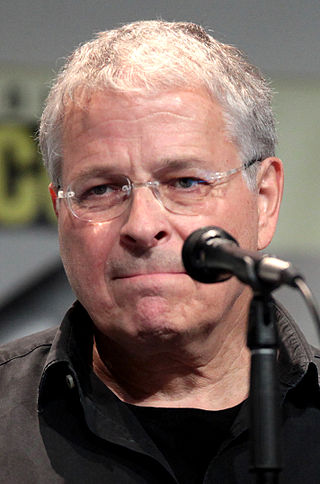
Lawrence Edward Kasdan is an American filmmaker. He is the co-writer of the Star Wars films The Empire Strikes Back (1980), Return of the Jedi (1983), The Force Awakens (2015), and Solo: A Star Wars Story (2018). He also wrote Raiders of the Lost Ark (1981) and The Bodyguard (1992), and is the writer-director of Body Heat (1981), The Big Chill (1983), Silverado (1985), The Accidental Tourist (1988), and Dreamcatcher (2003).

Out of Sight is a 1998 American crime comedy film directed by Steven Soderbergh and written by Scott Frank, adapted from Elmore Leonard's 1996 novel of the same name. The first of several collaborations between Soderbergh and actor George Clooney, it was released on June 26, 1998.
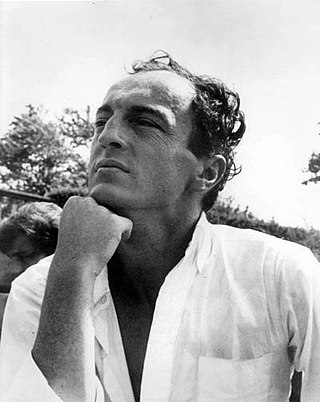
Francis Russell "Frank" O'Hara was an American writer, poet, and art critic. A curator at the Museum of Modern Art, O'Hara became prominent in New York City's art world. O'Hara is regarded as a leading figure in the New York School, an informal group of artists, writers, and musicians who drew inspiration from jazz, surrealism, abstract expressionism, action painting, and contemporary avant-garde art movements.

Donald Jay Fagen is an American musician who was the co-founder, lead singer, co-songwriter, and keyboardist of the band Steely Dan, formed in the early 1970s with musical partner Walter Becker. In addition to his work with Steely Dan, Fagen has released four solo albums, beginning with The Nightfly in 1982, which was nominated for seven Grammys.
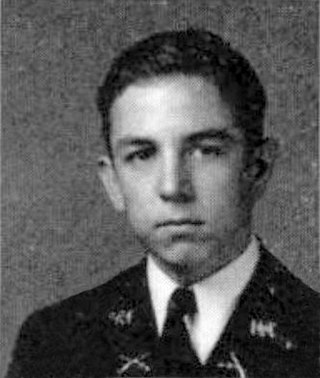
Terry Southern was an American novelist, essayist, screenwriter, and university lecturer, noted for his distinctive satirical style. Part of the Paris postwar literary movement in the 1950s and a companion to Beat writers in Greenwich Village, Southern was also at the center of Swinging London in the 1960s and helped to change the style and substance of American films in the 1970s. He briefly wrote for Saturday Night Live in the 1980s.
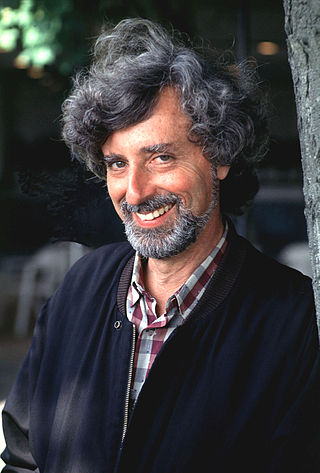
Philip Kaufman is an American film director and screenwriter who has directed fifteen films over a career spanning nearly five decades. He has received numerous accolades including a BAFTA Award along with nominations for an Academy Award, and a Primetime Emmy Award. He has been described as a "maverick" and an "iconoclast," notable for his versatility and independence often directing eclectic and controversial films. He is considered an "auteur" whose films have always expressed his personal vision. Kaufman's works have included genres such as realism, horror, fantasy, erotica, western, and crime.

Rudolph Van Gelder was an American recording engineer who specialized in jazz. Over more than half a century, he recorded several thousand sessions, with musicians including Booker Ervin, John Coltrane, Miles Davis, Thelonious Monk, Sonny Rollins, Art Blakey, Lee Morgan, Joe Henderson, Freddie Hubbard, Wayne Shorter, Horace Silver, Herbie Hancock, Grant Green and George Benson. He worked with many different record companies, and recorded almost every session on Blue Note Records from 1953 to 1967.
Donald "Don" Miller is an American author, public speaker, and business owner. He is the CEO of StoryBrand, a marketing company. He is also an author of personal essays and reflections about faith, God, and self-discovery. His first New York Times bestselling book was Blue Like Jazz and his latest book is called Hero on a Mission.

Samson Raphaelson was an American playwright, screenwriter and fiction writer.

Blue Like Jazz is the second book by Donald Miller. This semi-autobiographical work, subtitled "Non-Religious Thoughts on Christian Spirituality," is a collection of essays and personal reflections chronicling the author's growing understanding of the nature of God and Jesus, and the need and responsibility for an authentic personal response to that understanding. Much of the work centers on Miller's experiences with friends and fellow students while auditing courses at Reed College, a liberal arts college in Portland, Oregon. The book deals with inward spiritual dealings as Don, his friends Penny, Laura and others struggle with finding meaning in life and the ultimate battle with God ending with choosing him or choosing one's self.

Let's Make Love is a 1960 American musical comedy film made by 20th Century Fox in DeLuxe Color and CinemaScope. Directed by George Cukor and produced by Jerry Wald from a screenplay by Norman Krasna, Hal Kanter, and Arthur Miller, the film stars Marilyn Monroe, Yves Montand, and Tony Randall. It would be Monroe's last musical film performance.

Sweet Charity is a 1969 American musical comedy-drama film directed and choreographed by Bob Fosse in his feature directorial debut, written by Peter Stone, and featuring music by Cy Coleman and Dorothy Fields.

Blue Like Jazz is a 2012 American comedy-drama film directed by Steve Taylor and starring Marshall Allman, Claire Holt, and Tania Raymonde. It is based on Donald Miller's semi-autobiographical book of the same name. Miller, Taylor, and Ben Pearson co-wrote the screenplay.
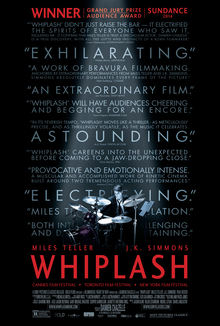
Whiplash is a 2014 American psychological drama film written and directed by Damien Chazelle, starring Miles Teller, J. K. Simmons, Paul Reiser, and Melissa Benoist. It focuses on an ambitious music student and aspiring jazz drummer (Teller), who is pushed to his limit by his abusive instructor (Simmons) at the fictional Shaffer Conservatory in New York City.

Spider-Man: Into the Spider-Verse is a 2018 American animated superhero film featuring the Marvel Comics character Miles Morales / Spider-Man, produced by Columbia Pictures and Sony Pictures Animation in association with Marvel Entertainment, and distributed by Sony Pictures Releasing. It is the first animated film in the Spider-Man franchise and the first film in the Spider-Verse franchise, which is set in a shared multiverse of alternate universes called the "Spider-Verse". Directed by Bob Persichetti, Peter Ramsey, and Rodney Rothman from a screenplay by Phil Lord and Rothman, it stars Shameik Moore as Morales, alongside the voices of Jake Johnson, Hailee Steinfeld, Mahershala Ali, Brian Tyree Henry, Lily Tomlin, Luna Lauren Vélez, John Mulaney, Kimiko Glenn, Nicolas Cage, and Liev Schreiber. The film's story follows Miles as he becomes the new Spider-Man and joins other Spider-People from various parallel universes who team up to save New York City from the Kingpin.



















